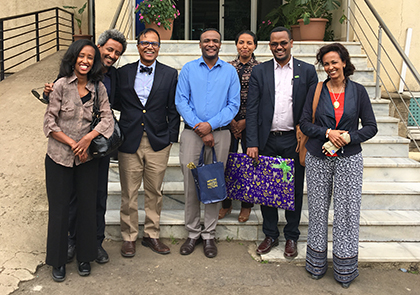St. Paul Hospital and Millennium Medical College (SPHMMC), in Addis Ababa, has partnered with UMMS to create the school’s first-ever fellowship training program in Gastroenterology. Ethiopia trainees follow similar curriculum to their UMMS counterparts, and even participate via web conferencing in the UMMS GI Division’s weekly Grand Rounds. The new fellowship, the latest in a long line of training collaborations between UMMS and SPHMMC, recently celebrated it’s one-year anniversary and the first participants are slated to complete the program this fall.

“It’s been a wonderful experience to help set this up. We are also planning to create opportunities for their trainees to showcase their cases to us and vice versa so all the fellows can learn from each other – what kind of cases and challenges are unique on each side?” said Dr. Hari Conjeevaram, MD, who helped launch the GI Ethiopia partnership and mentors the SPHMMC fellows. “Encouraging the trainees from both sides to interact strengthens the collaboration and the program.”
Dr. Conjeevaram will be among the presenters at the upcoming Jan. 26 Global Health Initiatives Forum, which will highlight multiple UMMS collaborations in East Africa. The event, open to students and faculty alike interested in global health, runs from 5:30 to 7:30 p.m. in BSRB Seminar Rooms A, B & C. RSVP here.
While he has collaborated on projects in other countries, especially India, helping to create the GI fellowship program Ethiopia marked Dr. Conjeevaram’s first work in Africa. A delegation from SPHMMC visited UMMS in 2015 to explore creating the new fellowship program, only the second such program in Ethiopia.
“Based on the population size, they should have a few thousand gastroenterologists (in Ethiopia). I think they have about a dozen, so they have a long way to go,” Dr. Conjeevaram said. “We’ve tried to help them establish a world-class, local training program that has the potential to grow over time and encourage more young doctors to pursue the field and stay after their training.”
The team plans to host a few of the SPHMMC fellows at UMMS for extended observerships later this year. Dr. Conjeevaram is also mentoring two fellows with their research thesis projects and the hope is to collaborate in other clinical research projects in the future. In the meantime, technology helps them keep in regular contact with their U-M mentors and counterparts. For more than six months, the teams have been using BlueJeans video conferencing software to allow the SPHMMC fellows to participate in UMMS GI grand rounds.
“We had just started making video conferencing available for our fellows and faculty here, because we have people at the VA or in satellite clinics who can’t always attend in person. When I heard they were setting up BlueJeans in Addis Ababa, I thought, ‘Why not bring them along?’” Dr. Conjeevaram said. “We have occasional connection difficulties, but overall it’s been very positive. They listen in and have the opportunity to ask questions. The GI Grand Rounds at UM is now part of their educational curriculum”
There are four SPHMMC fellows currently in the two-year program, which is expected to grow over time as those who complete it will then be able to mentor and encourage future participants. Two of the first fellows are expected to visit UMMS this year.
“The next step for the program is to establish a system so all their fellows have the opportunity to spend time here,” Dr. Conjeevaram said. “We really believe the best way to take this program to the next level is to have the trainees connect with each other in person and spend time with each other.”
